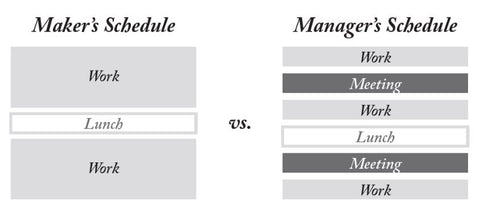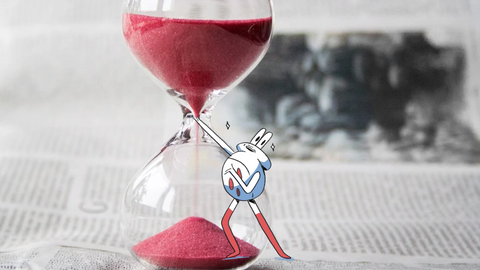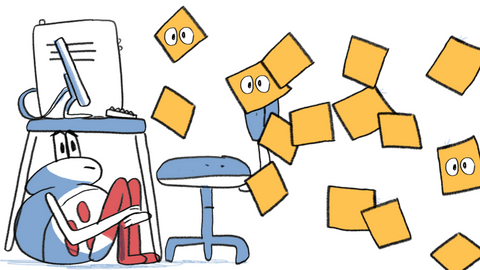It’s 3 o’clock on a rainy Tuesday afternoon, I’m in the zone. Headphones in, keyboard taping away. Just for a moment, I’m lost in my work. And then there it is, the dreaded tap on my shoulder. Like being awakened from a deep sleep. Suddenly I’m back in the office, the glare of the fluorescent lights, rumblings of chatter the constant ringing of phones. I swivel my chair around and am greeted by “Hey Dave, I was just passing and wanted to see how you were getting on”. 30 minutes later we are still chatting. Sound familiar?
The constant flow of emails, instant messages and the mind's ability to procrastinate on virtually any menial task. Distractions are everywhere!
Just this morning I was listening to the podcast 'Diary of a CEO’ where the host and business entrepreneur Steven Bartlett said “This may surprise you but I only check my emails once a week”. What? How? Well, his assistant checks his emails for him, deals with what she can and then prioritises the rest for Steven to efficiently respond in one session. He is ruthlessly prioritising what is important so he can get the most out of every day, hour and minute by avoiding context switching.
What is context switching?
I learned recently that the term 'context switching' came from computing. It’s used to describe how a computer pauses a task and saves where it was up to, before moving on to the next task.
So computers are to blame – or perhaps, computers were the original victim of us humans wanting more and more out of everything. I digress. Whichever way you look at it, a lot of context switching starts with a notification for us humans. A little red dot praying for your curiosity to learn more. In western culture, red signifies danger – it’s something that you need to deal with now.
Computers don’t have to deal with stress, they aren’t accountable to deadlines, and they don’t need to think deeply about a topic. Switching from a Slack conversation about the different shades of blue in Gmail to being tapped on the shoulder to give an update on a complex web application that you haven’t worked on in week?. It can be a real brain drain.
Back in 2013, Chris Parnin looked at the cost of interrupting developers he found:
- Developers take between 10 to 15 minutes to start editing code after an interruption.
- Interrupted tasks take twice as long and contain twice as many errors.
A culture of many interruptions can lead to people avoiding work until being distraction free.
This can often lead to people working in their own time, creating unnecessary pressure and stress on the person’s home life.
Why do we context switch?
I once copied the text from all my emails that I received in one morning into a website that gave an estimated reading time. It came back as three hours, which would be my entire morning. And that is on just one channel. At the time I also had multiple Slack groups, WhatsApp, Twitter and Teams all trying to improve their customer engagement rates and get us to use their products.
We are encouraged to work in the open, share more and get people involved. This can result in mountains of information in larger organisations a lot of which isn’t needed for everyone at least. In his book Agile Comms Giles Turnbull suggests:
Being considerate of people’s time use these three communication layers:
- The Lure: subject of an email, a tweet or a direct message.
- Context: body text your email, a blog post, a presentation.
- Detail: email attachment, a link to another website.
Imagine if your email stream was just a stream of 140-character tweets, succinct and to the point. How much time would that save us all?
According to research over half of the workers feel like it’s important to respond to a message quickly. We live in fear that if we are not replying, we are perceived as not to be working.
“If You Don’t Prioritize Your Life, Someone Else Will” - Greg McKeown
How context switching destroys your day
I’m reading through 600 lines of code trying to work out why my web page isn’t displaying correctly in Internet Explorer. I read somewhere that listening to classical music helps with focus. So I have Mozart’s Jupiter symphony streaming into my ears and I’ve turned off all my notifications to help me focus. Usually, our developer would fix this but she is on holiday, so it’s on me. After an hour I’ve narrowed it down, and I think I have the solution. As I begin to type I get a tap on the shoulder.
Before moving on let’s break this down:
Trying to fix the bug: This isn’t something I do every day so therefore I’m using my working memory. Working memory is limited both in its capacity and the length of time it holds information. If I was familiar with the task and code then my brain would use my long-term memory and probably be able to complete the task on autopilot.
Tapping on the shoulder: This raised my anxiety levels which reduced my working memory even further. If you learned how to drive you’d probably recall how difficult it was to change gears at first without stalling the car, and even thinking about turning the radio on could cause you to crash. All your attention is needed on those basic functions to allow you to drive safely.
I turned around, and I was asked again “How are you getting on?”. The 600 lines of code were whirling through my head. I opened my mouth but nothing came out. Eventually, I managed a “With what?”. It turned out it was a different project and after a couple of reminders, I tuned in.
After I’d given a quick update we chatted about our weekends and the weather for a good half hour. When I turned back to my screen my mind was blank. What was I even working on? I hadn’t checked my emails for a while so I opened outlook and began to respond to people. Before I knew it the day was over. I packed up, said goodbye and went home.
That night I woke up at 3am and remembered I’d forgotten to fix that bug, the horror.
In 1988 John Sweller coined the term Cognitive Load Theory, which suggests that our working memory is only able to hold a small amount of information at any one time. That day as I’d been relying on my working memory so much it led me to forget the important tasks I needed to complete
What can you do to combat context switching?
The story of the shoulder tapping is often a cause of the maker and manager schedules clashing. The maker needs space for deep thinking with their heads down in the work. Whereas the manager has their head up supporting and unlocking their team.

To combat context switching we have four tactics as part of the Team Tactics deck to support your team.
- Maker Time - Help your team spend time practising their craft. A single meeting can disrupt a whole afternoon. Get deeper work done by committing to a Maker’s Schedule.
- Ritual Reset - Reflect on and re-evaluate your team meetings and processes to create more space for what matters.
- My User Manual - Help your team understand how they can best work with you and each other. Getting people’s working preferences out in the open early will help remove friction between team members. A User Manual can help create an environment that promotes healthy working relationships.
- Agile Comms - Help your team communicate clearly and creatively about their work in progress.
In summary
- Our working memory is fragile and struggles to retain information.
- Be intentional with your time, block out time for deep thinking to prevent distractions.
- Do a ritual reset to be clear when and where people can get updates.
- Promote agile communication to keep communications lean and to the point.
Next steps
Pre-order Team Tactics for more strategies on workplace productivity.









